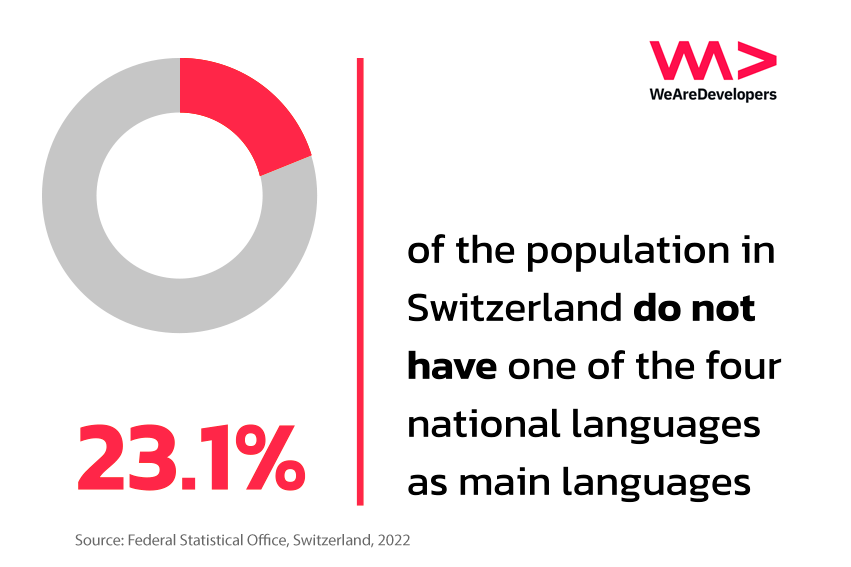Are you looking for a job in Switzerland? Well, you’re not alone. Switzerland is a powerful economy, home to major multinational companies driven by financial services and pharmaceuticals. With an emerging hub for startups and innovation, WIPO ranks Switzerland first in innovation output globally in 2023. They’re also well known for their high wages, so no doubt you might be looking at Swiss job opportunities. In that case, you’ll want to get familiar with their business culture and etiquette. So keep reading to learn the basics.
Cultural influence on business etiquette
Switzerland has four official languages, each spoken predominately in certain regions. These national languages are Swiss German (spoken by 62.3% of the population), French (22.8%), Italian (8%), and Romansh (spoken by just 0.5% of Swiss people).
Since, as scholars and mom-and-pop store owners agree, language is culture, the business culture in Switzerland changes from region to region, which makes it challenging to navigate at first sight, especially if you were expecting to split your work week between Zürich and Geneva. But a clear language distinction also means each region’s business conduct is somewhat foreseeable: The Italian and French-speaking regions might be more expressive during meetings and more welcome to hand gestures, while the German areas can be more conventional and crisp.

Still, it’s not as if each region of Switzerland is oblivious to the country as a whole. Fortunately, there are standard practices throughout, such as an appreciation for good manners and for working hard.

Depending on what type of company you will be involved with, rules will change. Big international companies with internal emails written in English are usually more lax and informal. At the same time, small and medium-sized Swiss firms, which compose over 99% of businesses, can be more old-fashioned and traditional. Still, in each region and in each kind of company, core Swiss values like punctuality, efficiency, politeness, and directness are shared.
According to official records, Swiss German is the most commonly used language in the workplace, followed by standard German, French, English, and Italian. So, even if English ranks pretty high, learning at least the basics of the local language is considered respectful, will earn you some credibility, and will probably allow you to grasp etiquette quickly. After all, culture is language.
Don’t mix up German with Swiss German
If you head to your first meeting with a Swiss company and are ready to introduce yourself with a very gentle German opening, remember that Swiss German and German are separate languages! The Swiss do not speak standard German (Hochdeutsch) but instead various Alemannic dialects collectively called Swiss German. The Swiss can adapt and try to speak German like Germans do, but not the other way around. So don’t put yourself in the awkward position of introducing yourself in German only to unintentionally compel your Swiss counterpart to be courteous and try to answer you in a dialect they never speak!

Working hours and punctuality
Swiss watches are world-famous for a reason: In business and personal matters, the Swiss take punctuality very seriously. Arriving on time is considered late, so getting there 5–10 minutes early is advised. If you will be late for an appointment or meet-up, you should call in advance and rush to avoid rescheduling. Punctuality is considered a matter of commitment.
Some expats who worked in Switzerland explain that the Swiss don’t expect you to show up to the meeting room ten minutes early. You can arrive sharp at the meeting and take a seat on time, provided you tour their building first and introduce yourself to the company. This advice stands for remote meetings. If you get a first interview, be in the waiting room at least ten minutes early. Your Swiss counterpart will let you into the meeting on time, but they’ll appreciate that you were there already.
The Swiss prioritise work-life balance and discourage contacting employees or employers outside working hours. Typical office hours are Monday to Friday, 08:00 to 17:30, with Swiss workers often working longer hours than most countries; this is clear in Switzerland-based international organisations, where the workers from Bern or Lausanne will put in longer work hours than their counterparts based in Rome, for example.
A 50-hour workweek is not uncommon, but the national average is 41.5 hours. Leisure time is highly valued too, so you can leave work on time without feeling at fault. Additionally, all Swiss employees are entitled to at least four weeks of annual leave, with a legal requirement of 14 consecutive days off.
Taking work seriously might be too obvious for the Swiss people. They’ve built up a country with an outstanding standard of living and very, very high prices. So if working hard allows you to earn first-class salaries to pay off your taxes, cover those prices, and get such an excellent quality of life in return, why not do your best?
Meeting times
Swiss businesspeople are known for their early morning meetings. Meetings at 7 a.m., which in Italy would be off-kilter, are not uncommon, Managers frequently arrive one hour before their employees, who in turn arrive between 7:30 and 9:00 a.m. So, yes: They’re early birds. If you land a remote job with a Swiss team, though, this will mean a more ample number of hours you can schedule meetings on.

Dress code
The only Swiss famous for their dressing style looked so outlandish in the Helvetic country that they had to move to Rome. Trivialities aside, the Swiss aren’t known for their fashion, since that’s a more French affair. So just don’t innovate too much with your office clothing, and you’ll be fine. Like everywhere else, the dress code may vary from company to company, and from sector to sector. Banking still favours the suit and tie. If you have any doubts, check group photos on LinkedIn to understand the company's dress code (and get a peek at their off-site culture). Yet, in general terms, the Swiss dress code is reserved and formal, favouring business attire. Try to dress modestly, avoiding extravagant displays of wealth. Avoid jeans or casual attire for initial business meetings. It's better to overdress than to underdress, so you should wear more professional attire the first few days and then adapt to your surroundings.
Fair business practices
In 2022, Switzerland was ranked as the seventh-least corrupt country by Transparency International. This means corruption and fraud in business dealings are not commonplace. However, the Tax Justice Network rated the Swiss banking sector as the most corrupt globally in 2018. Strong secrecy laws couldn’t prevent significant offshore banking industries from making headlines, which told the world how these banks allowed money laundering and the concealment of corruptly obtained funds. But banking, even if based in Switzerland, is a global sector, and these scandals are as “only Swiss” as being late to a chocolate factory appointment (not plausible). So don’t take the sensationalist offshore banking outrages as a sign that the Swiss are not into fair business practices. On the contrary: They are fair and well-meaning, and they’ll expect the same from you.
Gift-giving
In initial business meetings in Switzerland, there's no expectation to exchange gifts, as they are typically reserved for after negotiations are concluded. Acceptable gifts include a bottle of wine or a product from your home country. However, you should avoid giving expensive items, which may be interpreted as a bribe or flattery. With plenty of UN organisations headquartered in Geneva, better check the rulebook of each association before handing out a gift that might leave you blind sided.
Communication
In Swiss business etiquette, greetings typically involve a firm handshake with eye contact when meeting people for the first time. Use last names, titles, and formal pronouns — Sie, vous, lei — until invited to use first names, especially with differences in rank or age (this isn’t as clear-cut in international organisations, though, where you can use the first names as in the American business way).
Business cards are a must in Switzerland (although it’s not clear if those are back after their pandemic-induced break). Bring a reasonable stack of them and offer them to everyone you meet, not just clients, and make sure your professional rank is visible.
In business settings, avoid personal topics in conversations, as the Swiss are generally private people. Italian-speaking Swiss are relatively more open, but still reserved compared to Italians. Steer clear of topics related to Swiss neutrality, the world wars, and the Swiss military. You should also refrain from making jokes in the workplace until you know your colleagues well.
People who’ve worked in Switzerland insist that you should mimic your counterpart’s movements. This is an excellent piece of advice since it means you can work out your behaviour on the fly, just by observing. You should also be mindful of hand gestures, using them excessively can be considered rude, especially in the German-speaking parts. It can also lead to a gaffe, since, for example, the thumbs-up gesture means “one” in French (so if you’re in Geneva and need to ride the train, you can head up to the counter, make a thumbs-up and ask for one ticket to Lausanne).
Hierarchies in Swiss business culture
Swiss companies exhibit a rigid hierarchy, with final decisions made by top authority figures. Decisions, once reached, are rarely questioned as every stage of the hierarchy has approved them. Swiss business culture tends to be risk-averse, prioritising organisation, procedure, and planning. Long-term, detailed planning and tight schedules are the norm, so be prepared.
Once again, things may change depending on who you are working with. Organisations in French and Italian-speaking areas may adopt a more relaxed approach to planning. Companies with a strong international focus do delegate more responsibilities and decision-making to employees lower in the hierarchy.
Business socialising
Many employees consider bringing their lunch from home to be perfectly normal and acceptable, although this depends on your workplace — does it have a cafeteria or a microwave?
Socialising after work at bars and restaurants is common. Swiss people, while polite and easy-going, are reserved about their private lives even during social events. So conversations should typically revolve around professional or general topics.
The famous Swiss social tradition of Apéro is common in workspaces as well. Apéros range from small to large gatherings where drinks and finger food are served. It goes from cheese plates with wine to soft drinks and light nibbles. There's an Apéro for everything: birthdays, promotions, retirement, before holidays, or on Fridays.
Meetings and negotiations
Swiss business culture prefers well-planned meetings scheduled in advance, with a strict agenda and a focus on efficiency and consensus. Meetings expect active participation from all attendees. Humour and socialising are not typical during meetings in Swiss business culture, although some French and Italian-speaking Swiss may engage in small talk.
Business meetings are often held in restaurants, with discussions primarily focused on business. Dinner-table etiquette is essential during these restaurant meetings. The Swiss are challenging but fair negotiators, so be armed with patience and all the documentation needed to back up your claims. Your arguments should be persuasive and remember to outline every detail.
Finding jobs in Switzerland
The common ground among every Swiss region is respect. They respect diversity — they are inherently diverse — and they respect other people’s times. So if you are equally respectful to them, you’ll be setting yourself up for success.
The Swiss earn excellent salaries and have a very active economy. At WeAreDevelopers, we connect software experts with firms in Germany, Austria, and, of course, Switzerland. To start, create an online account in minutes and browse job opportunities from some of Switzerland’s most exciting firms. If you find a job somewhere else than Switzerland, read our etiquette guides for a splendid first impression. Viel Glück, bonne chance, and buona fortuna!









.png?w=720&auto=compress,format)

